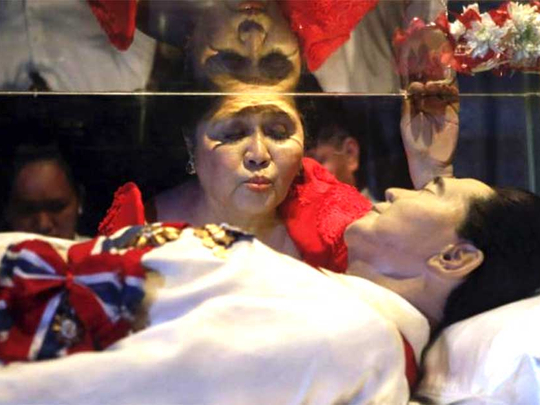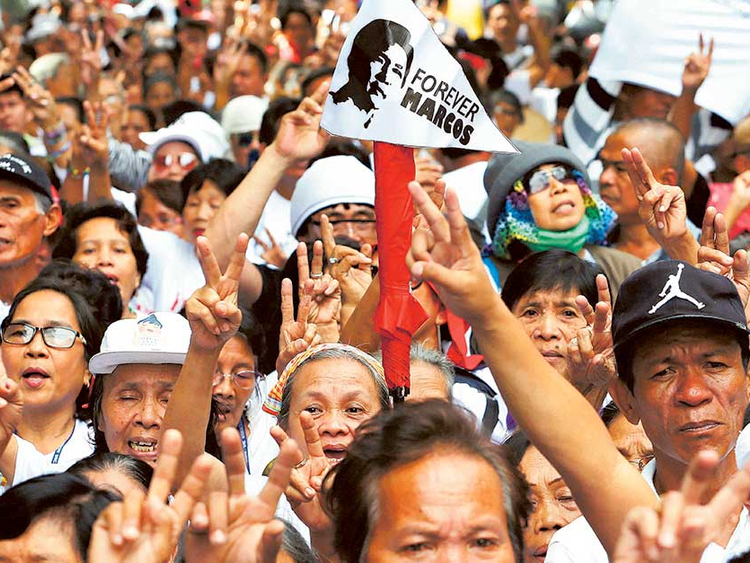
Manila: Ex-Philippine dictator Ferdinand Marcos can be given a hero’s burial, the Supreme Court decided on Tuesday in a hugely controversial ruling which critics said would whitewash his crimes and divide the nation.
The justices overwhelmingly endorsed President Rodrigo Duterte’s decision to allow the burial at the “Cemetery of Heroes” in Manila, three decades after a famous “People Power” revolt forced Marcos into US exile and restored democracy.
“There is no law that prohibits the burial,” court spokesman Theodore Te said as he read a summary of the judgement.
Hundreds of Marcos supporters outside the Supreme Court cheered. But opponents who had petitioned the court to reject the plan staged a rally nearby and voiced deep anger.
“It’s really sad because the decision makes liars out of human rights victims,” Neri Colmenares, who as a student leader was tortured by Marcos’s security forces during martial law, said outside the court.
“If the torturer is a hero, what does that make of the victims? What does that make of the millions who overthrew a dictator? It is a horrible and tragic ending to one of the most tragic chapters of our history. History was altered today.”
Family members of the former president and residents of northern Luzon celebrated and predicted healing, even as rights victims saw division and vowed to hold protest rallies.
“It’s time to move on. The Ilocanos (in northern Luzon) are now celebrating,” Marcos’ youngest daughter Irene Marcos Araneta told Gulf News at the opening of an art exhibit in Makati City.
“The decision should have been the sole prerogative of the president,” said the young Marcos, adding a Supreme Court’s decision seals the issue with “more meaning and substance”. She hinted of a Marcos burial “within the year”.
“The healing of a divided Philippines will now begin,” predicted former Senator Ferdinand ‘Bongbong’ Marcos who thanked Duterte and praised the Apex Court for taking “a magnanimous act to uphold the rule of law”.
“We lost the fight — with the kind of Supreme Court justices we have now,” lamented historian Fe Mangahas.
Congressman Edcel Lagman who filed the case against the decision reasoned that burying Marcos at the National Heroes Cemetery “would honour him as a hero”.
“I am puzzled to no end why majority of the High Court would allow the burial at the National Heroes Cemetery of a judicially and historically confirmed despot, plunderer and transgressor of human rights,” Lagman said, adding, “Motions for reconsideration will be filed soon.”
Marcos ruled the Philippines for two decades until key military figures turned on him and millions took to the streets in the “People Power” uprising, a largely peaceful event that inspired democracy movements throughout Asia and around the world.
Marcos, his infamously flamboyant wife Imelda and their cronies plundered up to $10 billion from state coffers during his rule, according to government investigators and historians.
The dictator also oversaw widespread human rights abuses to maintain his control of the country and enable his plundering, with thousands of people killed and tortured, previous Philippine governments said.
Anti-corruption watchdog Transparency International in 2004 named Marcos the second most corrupt leader of all time, behind Indonesian dictator Suharto.
The Philippines’ foreign debt went from $2.67 billion in 1972, when Marcos declared martial law, to $28.2 billion in 1986, according to the World Bank.
After Marcos died in Hawaii in 1989, his family began a successful political comeback and tried repeatedly to have him buried at the heroes’ cemetery, where other presidents and celebrated military figures are interned.
Imelda became a congresswoman and fended off all corruption charges against her.
Two of her children established themselves as influential politicians. Ferdinand “Bongbong” Marcos Jnr, was the more successful, becoming a senator before almost winning the vice presidency this year.
However previous presidents had refused to allow the burial in the heroes’ cemetery because of Marcos’s crimes, so the family kept the preserved body in a glass casket at his home in the northern province of Ilocos Norte.
The family’s fortunes changed with the election of Duterte, a longtime ally of the Marcos family, as president in May this year.
He said Marcos deserved to be buried at the heroes’ cemetery based on the fact he had been a president and a veteran of World War II.
Duterte also said he owed loyalty to the family because his father served in the Marcos government and the family had helped fund his election campaign.
Immediately celebrating the verdict, Bongbong Marcos said the nation of 100 million people would now be able to put past controversies behind it.
“It is in our belief a very important step for the healing process in the political arena of our country,” Marcos told CNN Philippines.
“I think this will be the beginning of bringing the country together and uniting the country.”
He said there was no date yet for the burial but all the preparations had already been made, signalling it would happen quickly.
His expectations of unity were met with howls of protests from Marcos critics, some of which announced rallies for Tuesday night.
“The decision intends to effectively wipe the Marcos slate clean and negates the sacrifices of the thousands of brave souls who fought and suffered under the brutal Marcos dictatorship,” Senator Risa Hontiveros said.










